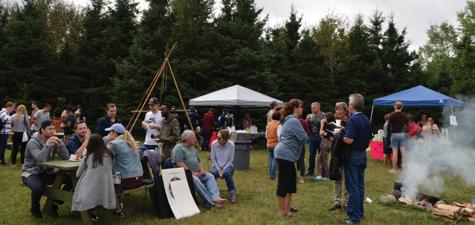
2 minute read
Public
TITLE Public
Engagement 1
STRATEGY
1. Develop one or more formal community partnership(s) with school districts, government agencies, non-proft organizations, NGOs, businesses and/ or other external entities, to work together to advance sustainability.
This includes campus-community partnerships that the institution supports (materially or fnancially) and that address sustainability challenges in the broader community. This may be demonstrated by having an active community partnership that meets one or more of the following criteria: a) The partnership is multi-year or ongoing, rather than a short-term project or event; b) The partnership simultaneously supports all three dimensions of sustainability, i.e. social equity and wellbeing, economic prosperity, and ecological health.
Effort should be made to ensure the partnership is inclusive and participatory, i.e. under-represented groups and/or vulnerable populations are engaged as equal partners in strategic planning, decision-making, implementation and review. 2. Develop multi-year and ongoing partnerships with Indigenous communities and Elders, cultural knowledge keepers, and Indigenous organizations to work together to advance sustainability.
ACTIONS
1.1 Support and encourage the development of the Northwestern
Ontario Sustainability Consortium (NORSC). 1.2 Explore the potential to partner with organizations on Campus as a Living
Laboratory activities (see Academics: Curriculum 1).
1.3 Investigate and build on existing partnerships.
2.1 Work with the Offce of Aboriginal
Initiatives to identify opportunities for new partnerships, and build on existing ones.
The annual Fall Harvest hosted by Aboriginal Cultural and Support Services has been a part of Lakehead University’s student orientation since 2008.
Public Engagement 2
Provide continuing education courses and programs in sustainability to the community.
STRATEGY
1. Offer continuing education courses that address sustainability.
2. Create at least one sustainabilitythemed certifcate program through its continuing education or extension department.
ACTIONS
1.1 Defne sustainability-focused and related courses.
1.2 Consult with Academics Working
Group. 1.3 Inventory all sustainability continuing education courses and identify opportunities for new courses. 1.4 Consult with the Continuing Education
Department on best approaches to developing new courses. 2.1 Support the development of the Ontario
Naturalist Program in Thunder Bay. 2.2 Create an ad hoc group to explore the development of a new sustainabilitythemed certifcate program (identify potential certifcate topics and partners).
Hazelwood Conservation Area. This photo was part of a collection of photos in the LUSU Nature in the North photography showcase.
Photo credit: Kezia Canuel








